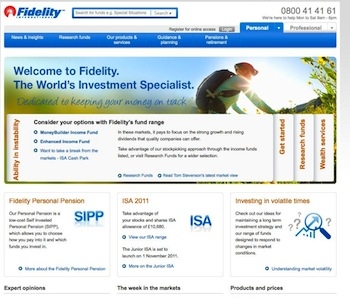Sanjeev Shah, portfolio manager, Fidelity Special Situations Fund: "As a contrarian, value investor looking for stocks which are cheap in an absolute sense and relative to their own valuation history, I am finding a lot of outstanding long-term opportunities in the market. Despite the uncertain economic environment, the current level of pessimism is extreme and selective valuations are very attractive.
"Market volatility over the last six months has given us the opportunity to add to preferred holdings at good prices in a range of sectors. These include Wolseley, the building materials company, and UBM and ITV in the media sector. Our most contrarian position at the moment is in the bank sector. These stocks are more under-owned and disliked than at any point in history and their valuations are cheap. Lloyds is around 0.4x book value. We do regularly stress test our assumptions on the banks and the results suggest that further downside from current valuations is minimal, while the upside remains potentially very significant.
"It is hard to know when the macro influences on markets will start to ease but at some stage the focus will come back to valuations. I believe the current environment is presenting excellent opportunities for investors prepared to look through the short-term volatility."
Alex Wright, Portfolio Manager, UK Smaller Companies Fund: "UK smaller companies are trading on close to a 50 per cent discount to their long term average. Even if the economy were to experience a further downturn, in many cases this is already being discounted in share prices. That's not to say there won't continue to be a degree of volatility. But the fact that smaller company stocks are out of favour is a good signal for the contrarian investor that this is an attractive time to be buying. In fact, we are finding some of our best opportunities at the moment in areas which are also the most out of favour."
Michael Clark, portfolio manager, Fidelity MoneyBuilder Dividend and Fidelity Enhanced Income Funds: "In 2012, I expect economic growth to be slow in both Europe and the UK. This is because banks will continue to have to shrink and restructure, and credit will continue to be scarce as a result. Consumers may feel slightly less pressure than they did in 2011, because we will not have tax increases, and inflat ion may come down, positively impacting real incomes, but I expect confidence to recover only slowly.
"Despite these concerns, I don't expect another deep recession, with the sharp falls in GDP we experienced in 2008. Equity markets, it's fair to say, are cheap. Valuations are low, and dividend yields are good. There is no evidence that dividends to shareholders are at risk, as they were in 2008. Negative sentiment, arising from the eurozone crisis and from low confidence here in the UK, is the main reason that share prices have fallen this year. However, it is a fact that negative sentiment does not last, and since valuation support is good, the chances of good equity performance in 2012 are very high. Therefore, I recommend that investors look through the current negative newspaper headlines and start thinking about investing now for the medium term."
In terms of global markets, Fidelity sees significant variation and troubles in Europe continuing but elsewhere there could be opportunity, particularly in some markets.
Amit Lodha, portfolio manager, Fidelity Funds Global Focus Fund and Fidelity Global Real Assets Securities Fund: "I expect global economic growth to remain muted in 2012, with a continued and marked divergence between developed world and emerging market growth rates. The sovereign debt issues in the eurozone are far from resolved and the political intervention and consensus needed to stem the crisis will take time to materialise. Meanwhile, I expect the European economy to enter into recession on the back of constrained bank lending and austerity measures. The policy response from the ECB will dictate the length and depth of the recession , and its socio-economic implications. I am getting incrementally concerned that Europe may be headed for a long period of slow economic growth similar to what happened in Japan.
"However, I am more constructive on the outlook for the US economy, where housing fundamentals are beginning to look more constructive. Housing starts data seems to be pointing to signs of improvements (from all time lows) and the Federal Reserve has kept interest rates low enough to incentivise buying versus renting activity. Meanwhile, emerging markets have significant long-term growth potential and many countries such as India, Indonesia and Thailand should benefit from inflation peaking in 2012. I expect the planned leadership change in China to be positive."
Aris Vatis, portfolio manager, Fidelity American Fund: "Given this uncertainty, Europe is now the number one risk and will impact on markets. In the US, the political pressure on both the Democrats and Republicans is such that we are likely to see some major tax/fiscal reform in the next few months, something that is not reflected in current valuations. In this uncertain environment, the US looks relatively defensive with housing starts, car sales and capex running well below normalised levels that could become main drivers for the economy into 2012. Following the recent rotation towards defensive sectors, areas like industrials and technology are becoming increasingly attractive."

